- Home
- Dan Simmons
Rise of Endymion Page 10
Rise of Endymion Read online
Page 10
I saw Aenea’s hooded figure nod in the reflected glow of the flashlight beam.
“This is crazy,” I said, swinging the flashlight beam around the empty street, against the wall of the brick warehouses, out to the dark river. The rush of dark water was frightening. Any thought of setting off on that was insane.
“Yes,” said Aenea. “Crazy.” The cold rain beat on the hood of her poncho.
I went around the kayak and took her by the arm. “You see the future,” I said. “When are we going to see each other again?”
Her head was bowed. I could make out only the barest gleam of her pale cheek in the reflected beam. The arm I gripped through the sleeve of the poncho might as well have been the branch of a dead tree for all the life I felt there. She said something too softly for me to make it out over the sound of the rain and the river.
“What?” I said.
“I said I don’t see the future,” she said. “I remember parts of it.”
“What’s the difference?”
Aenea sighed and stepped closer. It was cold enough that our breaths actually mingled in the air. I felt the adrenaline rush from anxiety, fear, and anticipation.
“The difference is,” she said, “that seeing is a form of clarity, remembering is … something else.”
I shook my head. Rain dripped in my eyes. “I don’t understand.”
“Raul, do you remember Bets Kimbal’s birthday party? When Jaev played the piano and Kikki got falling-down drunk?”
“Yeah,” I said, irritated at this discussion in the middle of the night, in the middle of the storm, in the middle of our departure.
“When was it?”
“What?”
“When was it?” she repeated. Behind us, the Mississippi flowed out of the darkness and back into darkness with the speed of a maglev train.
“April,” I said. “Early May. I don’t know.”
The hooded figure before me nodded. “And what did Mr. Wright wear that night?”
I had never had the impulse to hit or spank or scream at Aenea. Not until this minute. “How should I know? Why should I remember that?”
“Try to.”
I let out my breath and looked away at the dark hills in the black night. “Shit, I don’t know … his gray wool suit. Yeah, I remember him standing by the piano in it. That gray suit with the big buttons.”
Aenea nodded again. “Bets’s birthday party was in mid-March,” she said over the patter of rain on our hoods. “Mr. Wright didn’t come because he had a cold.”
“So?” I said, knowing very well what point she had just made.
“So I remember bits of the future,” she said again, her voice sounding close to tears. “I’m afraid to trust those memories. If I say when we will see each other again, it may be like Mr. Wright’s gray suit.”
For a long minute I said nothing. Rain pounded like tiny fists on closed coffins. Finally I said, “Yeah.”
Aenea took two steps and put her arms around me. Our ponchos crinkled against each other. I could feel the tightness of her back and the new softness of her chest as we hugged clumsily.
She stepped back. “Can I have the flashlight a moment?”
I handed it to her. She pulled back the nylon apron in the tiny cockpit of the kayak and shined the light on the narrow strip of polished wood there beneath the fiberglass. A single red button, under its clear, protective panel, gleamed in the rain. “See that?”
“Yeah.”
“Don’t touch it, whatever you do.”
I admit that I barked a laugh at that. Among the things I had read in the Taliesin library were plays of the absurd like Waiting for Godot. I had the feeling that we had flown into some latitude of the absurd and surreal here.
“I’m serious,” said Aenea.
“Why put a button in if it’s not to be touched?” I said, wiping the dripping moisture out of my face.
The hooded figure shook its head. “I mean, don’t touch it until you absolutely have to.”
“How will I know when I absolutely have to, kiddo?”
“You’ll know,” she said and gave me another hug. “We’d better get this into the river.”
I bent to kiss her forehead then. I had done this dozens of times over the past few years—wishing her well before one of her retreats, tucking her in, kissing her clammy forehead when she was sick with fever or half-dead from fatigue. But as I bent to kiss her, Aenea raised her face, and for the first time since we had met in the midst of dust and confusion in the Valley of the Time Tombs, I kissed her on the lips.
I believe that I have mentioned before how Aenea’s gaze is more powerful and intimate than most people’s physical touches … how her touch is like a jolt of electricity. This kiss was … beyond all that. I was thirty-two years old that night in Hannibal, on the west bank of the river known as the Mississippi, on the world once known as Earth, lost now somewhere in the Lesser Magellanic Cloud, in the dark and rain, and I had never experienced a jolt of sensation like that first kiss.
I pulled back in shock. The flashlight laser had tilted up between us and I could see the glint of her dark eyes … looking mischievous, perhaps, relieved, perhaps, as if a long wait had ended, and … something else.
“Good-bye, Raul,” she said, and lifted her end of the kayak.
My mind reeling, I placed the bow in the dark water at the bottom of the ramp and leveraged myself down and into the cockpit. A. Bettik had fashioned it for me like a well-tailored suit of clothes. I made sure not to depress the red button in my flailing around. Aenea shoved and the kayak was floating in twenty centimeters of water. She handed me the double-bladed paddle, then my backpack, and then the flashlight laser.
I aimed the beam at the dark water between us. “Where’s the farcaster portal?” I said. I heard the words from a distance, as if some third party had spoken. My mind and emotions were still dealing with the kiss. I was thirty-two years old. This child had just turned sixteen. My job was to protect her and to keep her alive until we could return to Hyperion and the old poet someday. This was madness.
“You’ll see it,” she said. “Sometime after daylight.”
Hours away then. This was theater of the absurd. “And what do I do after I find the ship?” I said. “Where do we meet?”
“There is a world named T’ien Shan,” said Aenea. “It means ‘Mountains of Heaven.’ The ship will know how to find it.”
“It’s in the Pax?” I said.
“Just barely,” she said, her breath hanging in the cold air. “It was in the Hegemony Outback. The Pax has incorporated it into the Protectorate and promised to send missionaries, but it hasn’t been tamed yet.”
“T’ien Shan,” I repeated. “All right. How do I find you? Planets are big things.”
I could see her dark eyes in the bouncing flashlight beam. They were moist with rain or tears, or both. “Find a mountain called Heng Shan … the Sacred Mountain of the North. Near it there will be a place called Hsuan-k’ung Ssu,” she said. “It means ‘Temple Hanging in Air.’ I should be there.”
I made a rude gesture with my fist. “Great, so all I have to do is stop at a local Pax garrison and ask directions to the Temple Hanging in Air, and you’ll be hanging there waiting for me.”
“There are only a few thousand mountains on T’ien Shan,” she said, her voice flat and unhappy. “And only a few … cities. The ship can find Heng Shan and Hsuan-k’ung Ssu from orbit. You won’t be able to land there, but you’ll be able to disembark.”
“Why won’t I be able to land there?” I said, irritated by all of these puzzles within enigmas within codes.
“You’ll see, Raul,” she said, her voice as filled with tears as her eyes had been. “Please, go.”
The current was trying to carry me away, but I paddled the buoyant little kayak back into place. Aenea walked along the river’s edge to keep pace with me. The sky seemed to be lightening a bit in the east.
“Are you certain we’ll see each other
there?” I shouted through the thinning rain.
“I’m not certain of anything, Raul.”
“Not even that we’ll survive this?” I’m not sure what I meant by “this.” I’m not even sure what I meant when I said “survive.”
“Especially not of that,” said the girl, and I saw the old smile, full of mischief and anticipation and something like sadness mixed with involuntary wisdom.
The current was pulling me away. “How long will it take me to get to the ship?”
“I think only a few days,” she called. We were several meters apart now, and the current was pulling me out into the Mississippi.
“And when I find the ship, how long to get to … T’ien Shan?” I called.
Aenea shouted back the answer but it was lost in the lapping of waves against the hull of my little kayak.
“What?” I yelled. “I couldn’t hear you.”
“I love you,” called Aenea, and her voice was clear and bright across the dark water.
The river pulled me out into it. I could not speak. My arms did not work when I thought to paddle against the powerful current. “Aenea?” I aimed the flashlight toward the shore, caught a glimpse of her poncho gleaming in the light, the pale oval of her face in the shadow of the hood. “Aenea!”
She shouted something, waved. I waved back.
The current was very strong for a moment. I paddled violently to avoid being pulled into an entire tree that had snagged on a sandbar, and then Î was out in the central current and hurtling south. I looked back but walls of the last buildings in Hannibal hid my dear girl from view.
A minute later I heard a hum like the dropship’s EM repulsore, but when I looked up I saw only shadow. It could have been her circling. It could have been a low cloud in the night.
The river pulled me south.
5
ather Captain de Soya deadheaded from Pacem System on the H.H.S. Raguel, an archangel-class cruiser similar to the ship he had been ordered to command. Killed by the terrible vortex of the classified instantaneous drive, known to Pax Fleet now as the Gideon drive, de Soya was resurrected in two days rather than the usual three—the resurrection chaplains taking the added risk of unsuccessful resurrection because of the urgency of the father-captain’s orders—and found himself at the Omicron2-Epsilon3 Pax Fleet Strategic Positioning Station orbiting a lifeless, rocky world spinning in the darkness beyond Epsilon Eridani in the Old Neighborhood, only a handful of light-years from where Old Earth had once existed.
De Soya was given one day to recover his faculties and was then shuttled to the Omicron2-Epsilon3 fleet staging area, a hundred thousand klicks out from the military base. The midshipman piloting the wasp-shuttle went out of his way to give Father Captain de Soya a good look at his new command, and—despite himself—de. Soya was thrilled with what he saw.
The H.H.S. Raphael was obviously state-of-the-art technology, no longer derivative—as all of the previous Pax ships de Soya had seen had been—of rediscovered Hegemony designs from before the Fall. The overall design seemed too lean for practical vacuum work and too complicated for atmosphere, but the overall effect was one of streamlined lethality. The hull was a composite of morphable alloys and areas of pure fixed energy, allowing rapid shape and function changes that would have been impossible a few years before. As the shuttle passed the Raphael in a long, slow ballistic arc, de Soya watched the exterior of the long ship go from chrome silver to a stealth matte black, essentially disappearing from view. At the same time, several of the instrument booms and living cubbies were swallowed by the smooth central hull, until only weapons’ blisters and containment field probes remained. Either the ship was preparing for out-system translation checks, or the officers aboard knew very well that the passing wasp carried their new commander and they were showing off a bit.
De Soya knew that both assumptions were almost certainly true.
Before the cruiser blacked into oblivion, de Soya noticed how the fusion drive spheres had been clustered like pearls around the central ship’s axis rather than concentrated in a single swelling such as on his old torchship, the Balthasar. He also noticed how much smaller the hexagonal Gideon-drive array was on this ship than on the prototype Raphael. His last glimpse before the ship became invisible was of the lights glowing from the retracted, translucent living cubbies and the clear dome of the command deck. During combat, de Soya knew from his reading on Pacem and the RNA-instructional injections he had received at Pax Fleet headquarters that these clear areas would morph thicker, armored epidermises, but de Soya had always enjoyed a view and would appreciate the window into space.
“Coming up on the Uriel, sir,” said the midshipman pilot.
De Soya nodded. The H.H.S. Uriel seemed a near-clone of the new Raphael, but as the wasp-shuttle decelerated closer, the father-captain could pick out the extra omega-knife generators, the added, glowing conference cubbies, and the more elaborate com antennae that made this vessel the flagship of the task force.
“Docking warning, sir,” said the midshipman.
De Soya nodded and took his seat on the number-two acceleration couch. The mating was smooth enough that he felt no jolt whatsoever as the connection clamps closed and the ship’s skin and umbilicals morphed around the shuttle. De Soya was tempted to praise the young midshipman, but old habits of command reasserted themselves.
“Next time,” he said, “try the final approach without the last-second flare. It’s showing off and the brass on a flagship frown on it.”
The young pilot’s face fell.
De Soya set his hand on her shoulder. “Other than that, good job. I’d have you aboard my ship as a dropship pilot anyday.”
The crestfallen midshipman brightened. “I could only wish, sir. This station duty …” She stopped, realizing that she had gone too far.
“I know,” said de Soya, standing by the cycling lock. “I know. But for now, be glad that you’re not part of this Crusade.”
The lock cycled open and an honor guard whistled him aboard the H.H.S. Uriel—the archangel, if Father Captain de Soya remembered correctly, that the Old Testament had described as the leader of the heavenly hosts of angels.
NINETY LIGHT-YEARS AWAY, IN A STAR SYSTEM only three light-years from Pacem, the original Raphael translated into real space with a violence that would have spit marrow from human bones, sliced through human cells like a hot blade through radiant gossamers, and scrambled human neurons like loose marbles on a steep hillside. Rhadamanth Nemes and her clone-siblings did not enjoy the sensation, but neither did they cry out nor grimace.
“Where is this place?” said Nemes, watching a brown planet grow in the viewscreen. Raphael was decelerating under 230 gravities. Nemes did not sit in the acceleration couch, but she did hang on to a stanchion with the casual ease of a commuter on her way to work in a crowded groundbus.
“Svoboda,” said one of her two male siblings.
Nemes nodded. None of the four spoke again until the archangel was in orbit and the dropship detached and howling through thin air.
“He’ll be here?” asked Nemes. Microfilaments ran from her temples directly into the dropship console.
“Oh, yes,” said Nemes’s twin sister.
A few humans lived on Svoboda, but since the Fall they had huddled in forcefield domes in the twilight zone and did not have the technology to track the archangel or its dropship. There were no Pax bases in this system. Meanwhile, the sunward side of the rocky world boiled until lead ran like water, and on the dark side the thin atmosphere hovered on the edge of freezing. Beneath the useless planet, however, ran more than eight hundred thousand kilometers of tunnels, each corridor a perfect thirty meters square. Svoboda was one of nine Labyrinthine worlds discovered in the early days of the Hegira and explored during the Hegemony. Hyperion had been another of the nine worlds. No human—alive or dead—knew the secret of the Labyrinths or their creators.
Nemes piloted the dropship through a pelting ammonia storm on the dark
side, hovered an instant before an ice cliff visible only on infrared and amplification screens, and then folded the ship’s wings in and guided it forward into the square opening of the Labyrinth entrance. This tunnel turned once and then stretched straight on for kilometers. Deep radar showed a honeycomb of other passages beneath it. Nemes flew forward three klicks, turned left at the first junction of tunnels, dropped half a kilometer from the surface while traveling five klicks south, and then landed the ship.
Here the infrared showed only trace heat from lava vents and the amplifiers showed nothing on the viewscreen. Frowning at the return on the radar displays, Nemes flipped on the drop-ship’s exterior lights.
For as far as she could see down the infinitely straight corridor, the walls of the tunnel had been carved into a row of horizontal stone slabs. On each slab was a naked human body. The slabs and bodies continued on and on into darkness. Nemes glanced at the deep radar display: the lower levels were also striated with slabs and bodies.
“Outside,” said the male sibling who had pulled Nemes from the lava on God’s Grove.
Nemes did not bother with the air lock. Atmosphere rushed out of the dropship with a dying roar. There was a hint of pressure in the cavern—enough that she would not have to phase-shift to survive—but the air was thinner than Mars had been before it was terraformed. Nemes’s personal sensors indicated that the temperature was steady at minus 162 degrees centigrade.
A human figure was outside waiting in the dropship’s floodlights.
“Good evening,” said Councillor Albedo. The tall man was impeccably dressed in a gray suit tailored to Pacem tastes. He communicated directly on the 75-megahertz band. Albedo’s mouth did not move, but his perfect teeth were visible in a smile.
Nemes and her siblings waited. She knew that there would be no further reprimands or punishment. The Three Sectors wanted her alive and functioning.
“The girl, Aenea, has returned to Pax space,” said Albedo.

 The Terror
The Terror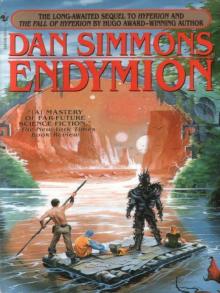 Endymion
Endymion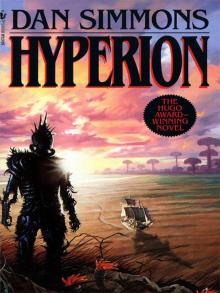 Hyperion
Hyperion The Crook Factory
The Crook Factory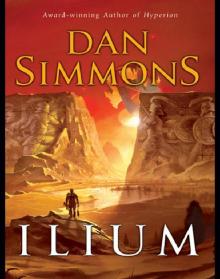 Ilium
Ilium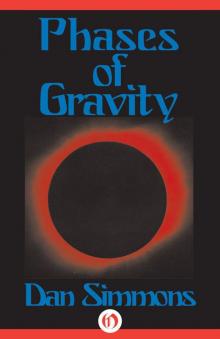 Phases of Gravity
Phases of Gravity Hardcase
Hardcase Fires of Eden
Fires of Eden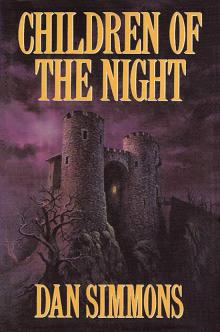 Children of the Night
Children of the Night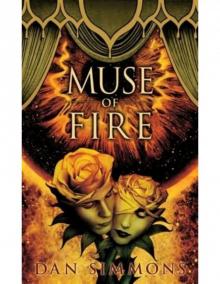 Muse of Fire
Muse of Fire Drood
Drood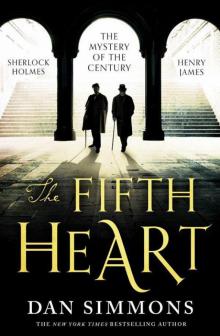 The Fifth Heart
The Fifth Heart Carrion Comfort
Carrion Comfort The Hollow Man
The Hollow Man Summer of Night
Summer of Night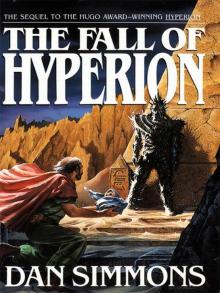 The Fall of Hyperion
The Fall of Hyperion Black Hills
Black Hills A Winter Haunting
A Winter Haunting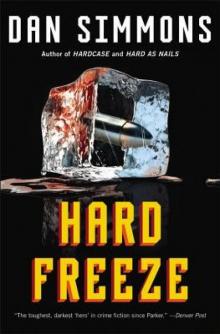 Hard Freeze
Hard Freeze Prayers to Broken Stones
Prayers to Broken Stones Hard as Nails
Hard as Nails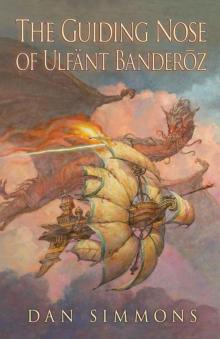 The Guiding Nose of Ulfant Banderoz
The Guiding Nose of Ulfant Banderoz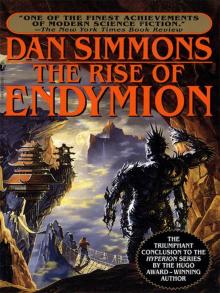 The Rise of Endymion
The Rise of Endymion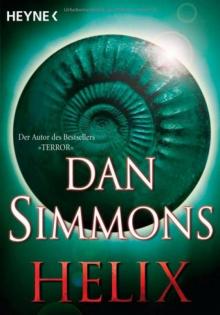 Orphans of the Helix
Orphans of the Helix Lovedeath
Lovedeath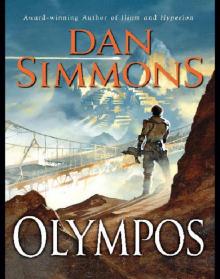 Olympos
Olympos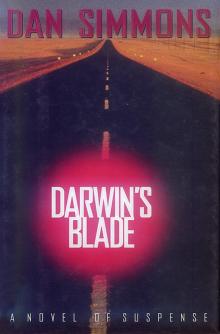 Darwin's Blade
Darwin's Blade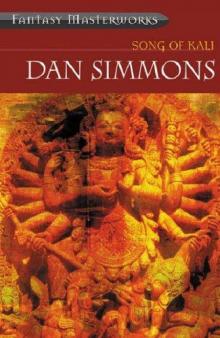 Song of Kali
Song of Kali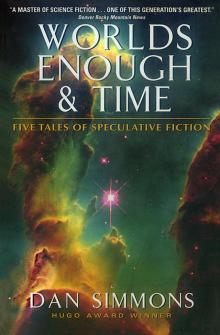 Worlds Enough & Time: Five Tales of Speculative Fiction
Worlds Enough & Time: Five Tales of Speculative Fiction The Abominable
The Abominable The Death of the Centaur
The Death of the Centaur Hard as Nails jk-3
Hard as Nails jk-3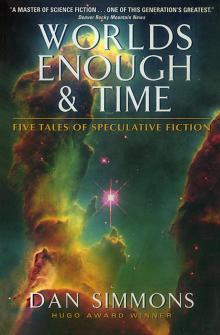 Worlds Enough & Time
Worlds Enough & Time Joe Kurtz Omnibus
Joe Kurtz Omnibus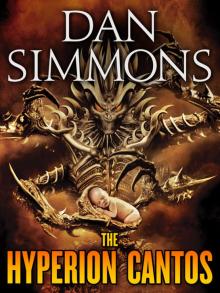 The Hyperion Cantos 4-Book Bundle
The Hyperion Cantos 4-Book Bundle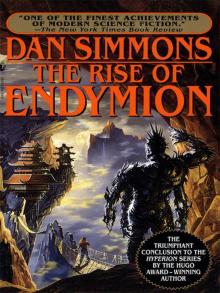 Rise of Endymion
Rise of Endymion Hard Freeze jk-2
Hard Freeze jk-2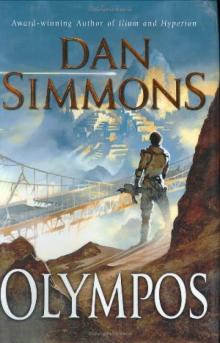 Olympos t-2
Olympos t-2 The Abominable: A Novel
The Abominable: A Novel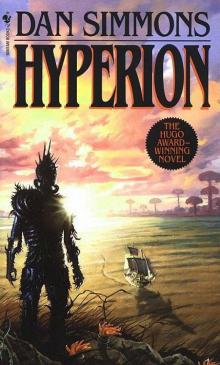 Hyperion h-1
Hyperion h-1 Remembering Siri
Remembering Siri Black Hills: A Novel
Black Hills: A Novel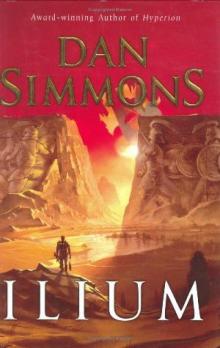 Ilium t-1
Ilium t-1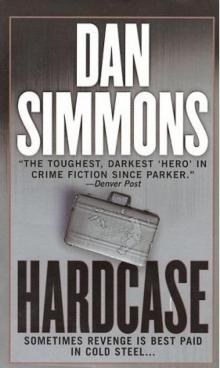 Hardcase jk-1
Hardcase jk-1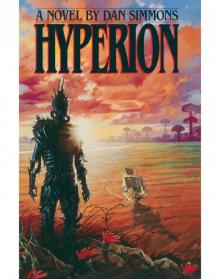 Hyperion 01 - Hyperion
Hyperion 01 - Hyperion